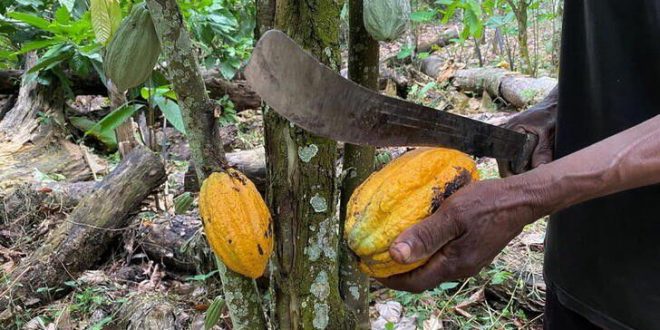RFI | Cameroon has announced that 99% of its cocoa can now be traced from individual farm plots to the export port – a significant step towards meeting new European Union sustainability requirements.
Accoridng to the minister of trade, Luc Magloire Mbarga Atangana, who chaired a forum in Yaoundé assessing the country’s readiness for the European Union’s Deforestation Regulation (EUDR), which comes into effect on 30 December 2025.
The EUDR will ban the import of key commodities – such as cocoa, coffee, soy, palm oil, wood, rubber, and cattle products – into the EU if they are linked to land deforested after 2020.
Officials say 24,800 cocoa farmers have been registered in Cameroon’s traceability system, covering more than 28,000 cocoa plots that have been geo-located and mapped. These efforts are built on a geo-referenced data-sharing agreement signed on 28 August 2024 by Cameroon’s cocoa and coffee inter-professional body.
The traceability tools allow exporters to identify the origins of cocoa and prove compliance with EU sustainability standards.
To support this, the Cameroon Coffee and Cocoa Inter-professional Council (CICC), in collaboration with the Sustainable Cocoa Programme, has launched a free, user-friendly traceability platform.
“All exporters now have access to the coordinates of the cocoa plots they source from,” said Omer Gatien Maledy, executive secretary of the CICC.
“The software is simple, easy to use, and freely available. It enables any exporter to verify and document the physical origin of their product.”
Another tool – GEOSHARE – has also been developed by the CICC. It provides parcel-level information to help exporters meet the EUDR’s traceability requirements.
Minister Mbarga Atangana welcomed the progress and reaffirmed the government’s commitment to inclusive compliance: “No farmer will be left behind. We are working to ensure that no cocoa is unfairly denied access to the European market.”
The EU postponed enforcement of the EUDR from 1 January 2025 to 1 January 2026 after appeals from producing countries like Cameroon.
The delay is seen as critical: the EU is Cameroon’s main export destination, receiving 78 percent of its cocoa and 87 percent of its coffee, according to official data.
As the world’s fifth-largest cocoa producer, Cameroon’s compliance with the EUDR is essential. The regulation requires adherence to seven key principles, including land rights, environmental protection, respect for labour and human rights, and obtaining free, prior, and informed consent from indigenous communities. It also demands compliance with rules on taxation, anti-corruption, trade, and customs.
Structural and policy obstacles
Despite significant progress, officials admit that major challenges remain. Chief among them is institutional fragmentation, with overlapping responsibilities and poor coordination between the ministries of agriculture, forestry, environment, and land Tenure. This lack of clarity creates loopholes and delays.
Moreover, many smallholder farmers lack formal land titles, making it difficult to invest in long-term sustainable practices. This also leaves them vulnerable to land grabs and evictions by speculators.
Cameroon also supports cocoa agroforestry—a practice that combines cocoa cultivation with forest conservation—as a sustainable model. However, the EU has yet to fully recognise agroforestry within its definition of deforestation-free agriculture.
“We strongly advocate for agroforestry, which we see as sustainable and beneficial,” Maledy said. “Unfortunately, the current EU regulation does not recognise its value. We intend to actively participate in upcoming review processes to ensure this approach is properly acknowledged.”
In the meantime, the CICC has intensified its efforts to raise awareness among farmers. NGOs have joined the campaign. In Ntui – a major cocoa-growing area – Agro Produce Management Services (AMS), a local NGO involved in cocoa certification, is training farmers in best practices such as pruning, fertiliser use, and environmental compliance.
AMS enforces a strict no-deforestation policy for its members. “We believe nearly all of our farmers are now aware of the EU regulation,” said Jacobel Ndam Mofor, a senior AMS official. “We do not accept new farmers who clear forest land to establish cocoa farms.”
Production ambitions vs. environmental commitments
Cameroon’s plan to triple cocoa production to 640,000 metric tonnes by 2030 risks clashing with the EU’s sustainability standards. Experts warn that this goal is unlikely to be met through yield improvements alone.
“Climate change and ageing cocoa trees are limiting productivity across West Africa,” said Vignesh Kamath, Associate Programme Officer at UNEP-WCMC. “Cameroon will likely need to expand the area under cocoa cultivation to meet its targets.”
However, such expansion could contravene the EUDR’s deforestation rules, leaving producers with cocoa that may not be eligible for the EU market.
 CameroonOnline.org Cameroon news, Actualité Camerounaise, live Web TV & Radio, World News and a lot more
CameroonOnline.org Cameroon news, Actualité Camerounaise, live Web TV & Radio, World News and a lot more




One comment
Pingback: Cameroon nears full cocoa traceability as EU deadline looms, but risks remain - Cameroun Post